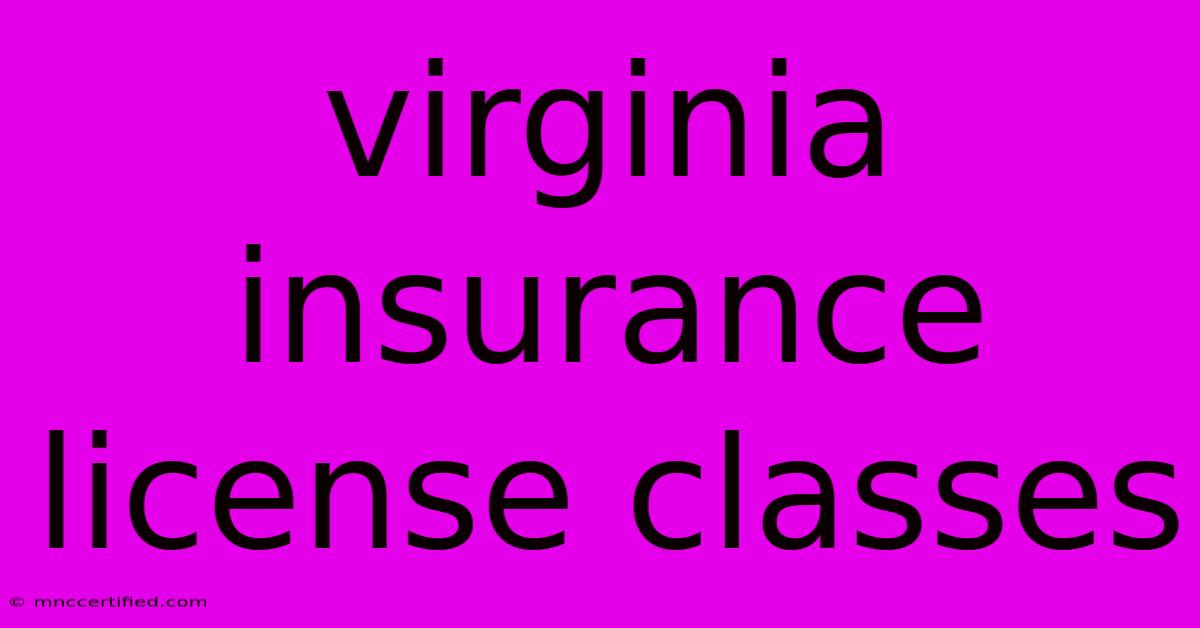Virginia Insurance License Classes

Table of Contents
Virginia Insurance License Classes: A Complete Guide
Navigating the world of Virginia insurance licensing can feel overwhelming. Understanding the different license classes is the first crucial step towards a successful career in the insurance industry in the Commonwealth. This comprehensive guide breaks down the various Virginia insurance license classes, outlining the requirements and the types of insurance each license allows you to sell.
Understanding the Virginia Insurance License Structure
The Virginia Bureau of Insurance handles licensing and regulation for all insurance professionals. The licensing system is structured around different classes, each permitting the sale of specific insurance products. These classes aren't mutually exclusive; you can hold multiple licenses to expand your service offerings. It's crucial to obtain the correct license class(es) to legally sell insurance in Virginia.
Key Virginia Insurance License Classes
Here's a breakdown of some of the most common Virginia insurance license classes:
1. Property and Casualty (P&C) Licenses
This broad category encompasses several sub-classes, allowing you to sell a wide range of insurance products.
-
Lines of Authority: These licenses authorize you to sell various property and casualty insurance policies, including:
- Auto Insurance: Covers vehicles against damage and liability.
- Homeowners Insurance: Protects residential properties against damage and liability.
- Renters Insurance: Covers personal belongings and liability for renters.
- Commercial Property Insurance: Protects businesses and their assets.
- Commercial Auto Insurance: Covers business vehicles and liability.
- Umbrella Liability Insurance: Provides additional liability coverage beyond primary policies.
-
License Types: Within P&C, you'll find different license designations based on the specific lines of authority. Carefully review the specific requirements for each line of authority you intend to pursue.
2. Life and Health Insurance Licenses
This category covers licenses for selling insurance products related to life and health risks.
-
Lines of Authority: These licenses enable you to sell policies including:
- Life Insurance: Protects beneficiaries upon the death of the insured. This includes term life, whole life, universal life, and variable life insurance.
- Health Insurance: Covers medical expenses, including individual and family health plans, Medicare supplement plans (Medigap), and long-term care insurance.
- Disability Insurance: Provides income replacement in case of illness or injury.
- Annuities: Provide a stream of income for a specified period or lifetime.
-
License Types: Similar to P&C, life and health licenses can be broken down into more specific lines of authority, requiring individual application and examination.
3. Other Important Licenses
Beyond the core P&C and Life & Health licenses, other specialized licenses exist in Virginia, such as:
- Adjusters: These professionals investigate and settle insurance claims. Separate licensing is required for different types of claims (property, casualty, etc.).
- Surplus Lines Brokers: These brokers handle insurance placements with non-admitted insurers (those not licensed to operate in Virginia). This requires specialized knowledge and licensing.
Obtaining Your Virginia Insurance License: A Step-by-Step Guide
The process generally involves:
- Meeting Eligibility Requirements: This includes age, residency, and background check requirements.
- Completing Pre-Licensing Education: You'll need to complete specific courses for the chosen license class. Many online and in-person options are available.
- Passing the State Exam: The Virginia State Board for the examination for each license class.
- Submitting your Application: Complete the application and submit it with all required documentation and fees.
- Background Check: You’ll need to pass a criminal background check.
- Fingerprinting: Fingerprinting is usually a required part of the background check process.
Maintaining Your Virginia Insurance License
Once licensed, you'll need to maintain your license through continuing education requirements. Failure to meet these requirements can lead to license suspension or revocation. Regularly check the Virginia Bureau of Insurance website for updates on continuing education mandates.
Choosing the Right License Class for You
The best license class for you depends on your career goals and interests. Research the different options thoroughly and consider factors such as:
- Market Demand: Certain insurance lines are in higher demand than others.
- Your Skills and Interests: Some roles might be a better fit for your personality and talents.
- Career Progression: Consider long-term career aspirations and how different licenses can help you achieve your objectives.
This guide offers a solid foundation for understanding Virginia insurance license classes. Remember to consult the official Virginia Bureau of Insurance website for the most up-to-date and accurate information. Always prioritize accurate information and comply with all regulations to ensure legal and ethical practice within the insurance industry.

Thank you for visiting our website wich cover about Virginia Insurance License Classes. We hope the information provided has been useful to you. Feel free to contact us if you have any questions or need further assistance. See you next time and dont miss to bookmark.
Featured Posts
-
Texas Vs Arkansas Live Stream And Kickoff
Nov 17, 2024
-
Englands Turner Debuts Wi Bowls
Nov 17, 2024
-
Live Stream Clemson Vs Pittsburgh Football
Nov 17, 2024
-
England Vs South Africa Live Score Updates
Nov 17, 2024
-
Ufc 309 Jones Miocic Fight Results
Nov 17, 2024